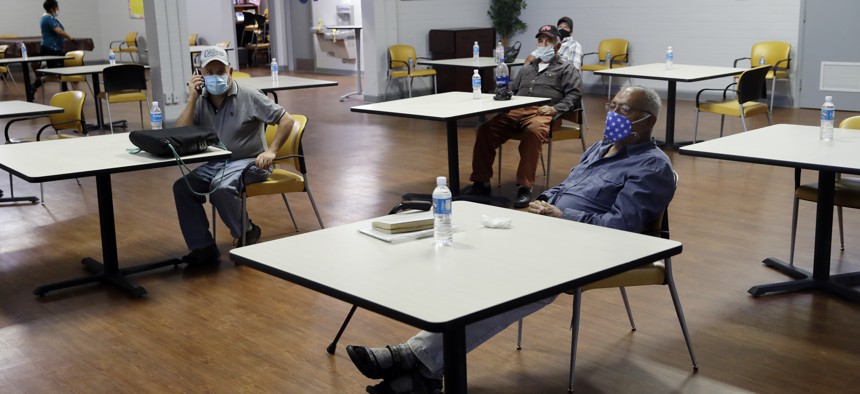Cities Rethink How to Cope with Extreme Heat During Covid-19 Outbreaks

A group of men sit with socialdistincing inside an air conditioned room at a cooling center as temperatures rise amid the COVID-19 pandemic Wednesday, May 6, 2020, in Los Angeles. AP Photo/Marcio Jose Sanchez

Connecting state and local government leaders
Cities are enforcing capacity restrictions at cooling centers and offering free air conditioners as a way to beat the heat.
The local library or public pool might typically offer relief amid a summer heat wave. But with both coronavirus outbreaks and temperatures on the rise across the United States, local government leaders are rethinking strategies to keep residents cool and safe.
Heat advisories were in effect in cities up and down the East Coast Monday, where heat indices have soared into the triple digits. The heat wave could continue in some parts of the mid-Atlantic through the end of the week.
In Boston, where libraries and public pools remain closed as a precaution to prevent the spread of Covid-19, the city opened 20 cooling centers at family and youth facilities to offer residents a way to escape the heat. The centers will only allow 40% capacity so that people can keep appropriate physical distances from each other and face masks are required to enter. The city encouraged residents to call ahead to determine the capacity available at a center before visiting.
Mayor Marty Walsh encouraged residents seeking shelter at cooling centers or elsewhere in the city to continue to practice social distancing, to avoid crowds and to wear a face covering.
“If the face covering causes you to overheat, find a shaded area where you can maintain 6 feet of distance from others, and then remove the face covering so that you can breathe easily and cool down,” Walsh said in a statement announcing the openings.
New York City announced its heat emergency plan back in May, allotting money to pay for the purchase and installation of home air conditioners and to pay bills for some residents so they can afford to keep them running.
At a cost of $55 million, the city is distributing 74,000 air conditioners to low-income seniors. To qualify for the program, seniors must have an income of 60% or less below the state median income and not have any air conditioning in their home currently.
As of this week, the city has installed about 40,000 window units, said Mitch Schwartz, deputy press secretary for Mayor Bill de Blasio.
The soaring temperatures could provide a particularly dangerous heat island effect for people who live in heavily urbanized cities, scientists with the Union of Concerned Scientists warned in a blog post last week about the impending heat wave.
They urged local governments to continue to make cooling centers available when possible to do so safely, but also to target resources like free air conditioners or repairs of existing appliances at the homes of older adults who may be more susceptible to both heat-related illnesses and coronavirus so that they can remain cool in their residences.
Soaring temperatures have also led some cities to scale back or cancel outdoor coronavirus testing or food distributions programs to prevent residents and staff from waiting in the extreme heat.
In Washington, D.C., where temperatures were expected to hit 99 degrees on Monday, the city closed its outdoor coronavirus testing sites as well as its grocery distribution sites.
The Maryland Department of Health announced it is monitoring the weather conditions across the state and will adjust outdoor Covid-19 testing site hours as appropriate.
St. Mary’s County, Maryland announced Monday that it scaled back the hours at one of its outdoor Covid-19 testing facilities to 8 to 11 a.m. each day this week out of concern over the safety of employees and community members.
“Outdoor operations are preferred at this time for best ventilation and distancing, but we are looking into other options for future events at varying times and locations to ensure that COVID-19 testing is available in our community,” said Dr. Meena Brewster, the health officer for St. Mary’s County.
Andrea Noble is a staff correspondent with Route Fifty

NEXT STORY: Local Pushback Over Federal Officers in Portland Grows As Trump Threatens Feds Could Deploy to Other Cities




